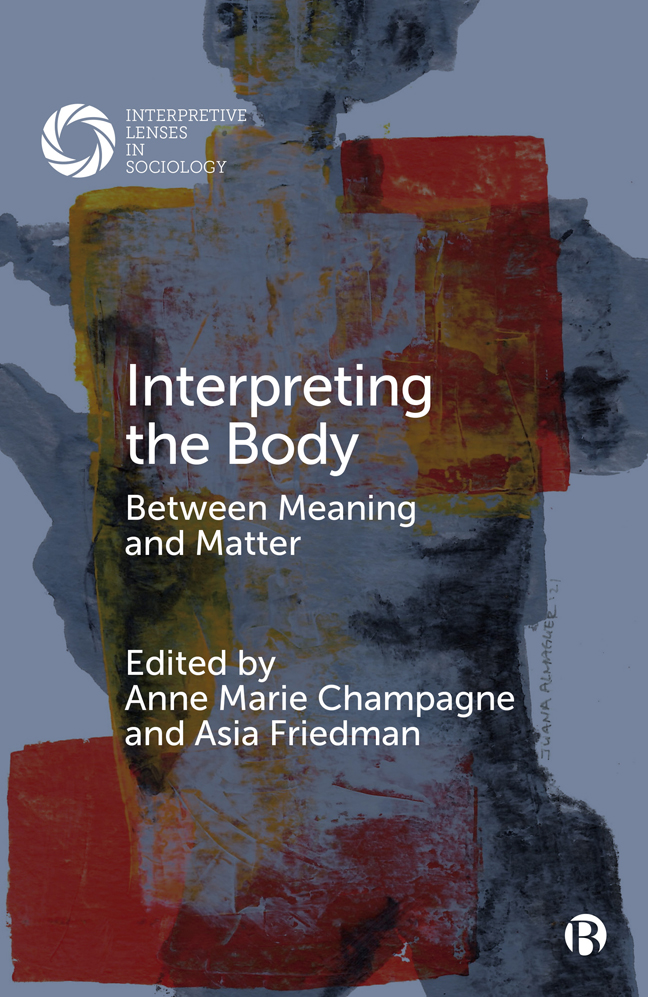Book contents
- Frontmatter
- Dedication
- Contents
- Series Editors’ Preface: Interpretive Lenses in Sociology—On the Multidimensional Foundations of Meaning in Social Life
- Notes on Contributors
- Preface and Acknowledgments
- Introduction: Between Meaning and Matter
- 1 Toward a Strong Cultural Sociology of the Body and Embodiment
- 2 Thinking the Molecular
- 3 Interpreting Africa's Seselelãme: Bodily Ways of Knowing in a Globalized World
- 4 Gender on the Post-Colony: Phenomenology, Race, and the Body in Nervous Conditions
- 5 Reinterpreting Male Bodies and Health in Crisis Times: From “Obesity” to Bigger Matters
- 6 Beauty, Breasts, and Meaning after Mastectomy
- 7 “You Are Not the Body”: (Re)Interpreting the Body in and through Integral Yoga
- 8 Black Girls’ Bodies and Belonging in the Classroom
- 9 Embodied Vulnerability and Sensemaking with Solidarity Activists
- 10 Our Bodies, Our Disciplines, Our Selves
- Index
2 - Thinking the Molecular
Published online by Cambridge University Press: 23 January 2024
- Frontmatter
- Dedication
- Contents
- Series Editors’ Preface: Interpretive Lenses in Sociology—On the Multidimensional Foundations of Meaning in Social Life
- Notes on Contributors
- Preface and Acknowledgments
- Introduction: Between Meaning and Matter
- 1 Toward a Strong Cultural Sociology of the Body and Embodiment
- 2 Thinking the Molecular
- 3 Interpreting Africa's Seselelãme: Bodily Ways of Knowing in a Globalized World
- 4 Gender on the Post-Colony: Phenomenology, Race, and the Body in Nervous Conditions
- 5 Reinterpreting Male Bodies and Health in Crisis Times: From “Obesity” to Bigger Matters
- 6 Beauty, Breasts, and Meaning after Mastectomy
- 7 “You Are Not the Body”: (Re)Interpreting the Body in and through Integral Yoga
- 8 Black Girls’ Bodies and Belonging in the Classroom
- 9 Embodied Vulnerability and Sensemaking with Solidarity Activists
- 10 Our Bodies, Our Disciplines, Our Selves
- Index
Summary
What are you made of? Look at your hands. Draw one palm across the other. Feel the density of your tissues, the bones, musculature, and sinuous ligaments. What gives your tissues substance and form? You have probably been told that your body is composed of trillions of living cells. But what are your cells made of? What is the stuff of life?
— Natasha Myers, Rendering Life MolecularIn this chapter, I contest the assumed primacy of technoscientific and biochemical methods in determining what human (and other) bodies are made of. From a perspective grounded in critical race, cultural, and performance studies, as well as embodied artistic research, I offer an expanded molecular theory of identity that foregrounds the radical asymmetry of what are still too often glossed as sociocultural signs or attributes rather than material substances. This argument builds upon and extends my previous theorization of technique as knowledge (Spatz, 2015, 2020a). I begin by surveying a handful of recent critical treatments of “hard”—that is, technoscientifically graspable—physical and chemical molecules that foreground their racial and gendered construction. I then consider the politics implied by a more expansive conception of the molecular, comparing and contrasting this with theories of the molecular that follow Gilles Deleuze and Félix Guattari. The final section begins to imagine the implications of such a conceptual shift for experimental research methods. These include not only a richer way to theorize embodied difference but also a radical reshuffling of the dominant disciplinary hierarchies that attach greater epistemic primacy to more quantitative methods. To understand the radical asymmetry of the molecular, I argue, we must recognize that critical race theory and other politicized new materialisms refer as much to the substance of the world as do the harder sciences.
Hard and soft molecules
As Natasha Myers explains in Rendering Life Molecular, the discovery and definition of biochemical molecules as “the stuff of life” has revolutionized the scientific understanding of human embodiment and led, like other technoscientific developments, to the invention and implementation of technologies with far-reaching impact that only continues to grow. “In the twenty-first century,” Myers writes, “life and living bodies have been rendered thoroughly molecular” (2015, p x), so that the very word life in some contexts becomes almost synonymous with an analysis of the cells, tissues, and molecules that biochemistry, neuroscience, physiology, and other technoscientific disciplines investigate.
- Type
- Chapter
- Information
- Interpreting the BodyBetween Meaning and Matter, pp. 44 - 65Publisher: Bristol University PressPrint publication year: 2023



